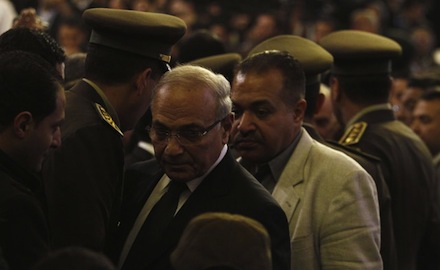If vote counts continue on their current course, Ahmed Shafiq, 71, will finish in second place in the first round of the Egyptian presidential election with around 24% of the vote, thereby vaunting him into a runoff with the Muslim Brotherhood’s candidate, Mohammed Morsi.![]()
Shafiq, among the top five candidate vying for the Egyptian presidency, is the most ‘felool’ — the ‘remnants’ associated with the former Mubarak regime. A senior commander in the Egyptian air force dating back to the days of the Sadat era, Shafiq served as commander of Egypt’s Air Force from 1996 to 2002. Thereupon, he served as the minister of civil aviation from 2002 to 2011.
He was Mubarak’s final prime minister as well, having been appointed at the end of January 2011 in response to the Tahrir Square protests against Mubarak’s rule.
As such, he is seen not only as the premier ‘felool’ candidate, but also the favored candidate of the Egyptian army, and the favored candidate of the Supreme Council of Armed Forces that has governed Egypt during its transition since the fall of former president Hosni Mubarak in February 2011. He is seen as the stand-in, in many ways, to Omar Suleiman, Mubarak’s longtime intelligence chief and Mubarak’s final vice president. Either one, in a runoff against an Islamist, must certainly represent the “deep state” of Egyptian public life.
Indeed, he was forced to step down by the SCAF in March 2011 after a television confrontation with Alaa Al Aswany, the author of The Yacoubian Building, when he was widely seen to have failed miserably in the exchange:
Mr. Aswany and Mr. Shafiq promptly clashed on a range of issues, including comments by Mr. Shafiq during the uprising against Mr. Mubarak that Tahrir Square should be cleaned up and turned into an Egyptian version of London’s Hyde Park, where protesters could occasionally go and give speeches.
Mr. Aswany accused Mr. Shafiq of ignoring the more than 300 people who died in the protests and wanting to give out “sweets and chocolate”…
“It made clear why Mr. Shafiq couldn’t survive. He was not able to defend his rationale for being prime minister,” said Ibrahim Al Nour, a political-science professor at American University in Cairo.
Mr. Nour said Mr. Shafiq’s arguments amounted to telling people that he deserved to lead because he had served in the military. “Shafiq was using the same logic as Mubarak that no one is buying anymore.” Mr. Shafiq could not be reached for comment.
Given that he represents, to many Egyptians, a step backward to the Mubarak regime, he will have to work hard to show his independence, both from the Mubarak era and from SCAF if he wants to have any chance of winning the runoff against Morsi — after coming so far from the high of the revolution that began in Tahrir Square, through the January parliamentary elections, and now through Egypt’s first contested presidential election, voters are likely to be hesitant to support a candidate seen as a throwback who might endanger Egypt’s fragile democratic gains. Even as voters were going to the polls, former Arab League secretary-general Amr Moussa was calling on Shafiq to withdraw from the race to allow Egypt a true opportunity to escape its authoritarian past.
Shafiq’s campaign in the first round emphasized restoring law and order in a country that’s seen more than its fair share of tumult in the troubled 15 months since the fall of Mubarak. If he has any shot of winning, he will have to add Egypt’s economic security to his platform as well. He will also have to convince voters that the Islamist Morsi is a dangerous ideologue who is more concerned with sharia law and transforming Egypt into an Islamic society than he is with restoring Egypt’s security and building Egypt’s economy.
With supporters of moderate Islamist Abdel Moneim Aboul Fotouh likely to unite behind Morsi’s candidacy, Shafiq’s hope for the presidency rest on winning over the support of voters for Moussa, who was also hurt by his association with Mubarak, having served as Egypt’s foreign minister for 10 years in the 1990s. He might also find fertile ground in the supporters of Dignity Party leader Hamdeen Sabahi, whose neo-Nasserist nationalism struck a chord with many Egyptians at the end of the first-round campaign.

4 thoughts on “Egypt runoff: who is Ahmed Shafiq?”